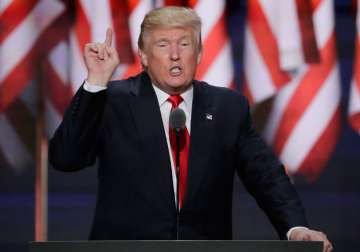Donald Trump slams Hillary Clinton’s legacy of ‘death, destruction, terrorism’; vows to restore order
Republican presidential nominee Donald Trump today declared that the ‘US is in crisis’ and vowed to fix within the confines of traditional politics.
Cleveland: Republican presidential nominee Donald Trump today declared that the ‘US is in crisis’ and vowed to fix within the confines of traditional politics.
Addressing the finale of his party's less-than-smooth national convention, Trump said that ‘as President he will restore the safety, strictly curb immigration and save the nation from Hillary Clinton's record of death, destruction, terrorism and weakness’.
"I have joined the political arena so that the powerful can no longer beat up on people that cannot defend themselves," the 71-year-old celebrity businessman said while accepting the Republican nomination for presidential election.
His address on the closing night of the convention marked his highest-profile opportunity yet to heal those divisions and show voters he's prepared for the presidency. Ever the showman, he fed off the energy of the crowd, stepping back to soak in applause and joining the delegates as they chanted, "USA."
As the crowd, fiercely opposed to Clinton, broke out in its oft-used refrain of "Lock her up," he waved them off, and instead declared, "Let's defeat her in November." Yet he also accused her of "terrible, terrible crimes" and said her greatest achievement may have been staying out of prison.
He offered himself as a powerful ally of those who feel Washington has left them behind.
"I'm with you, and I will fight for you, and I will win for you," he declared.
He accused Clinton, his far-more-experienced Democratic rival, of utterly lacking the good judgment to serve in the White House and as the military's commander in chief.
"This is the legacy of Hillary Clinton: death, destruction, terrorism and weakness," he said. "But Hillary Clinton's legacy does not have to be America's legacy."
In a direct appeal to Americans shaken by a summer of violence at home and around the world, Trump promised that if he takes office in January, "safety will be restored."
As he moves into the general election campaign, he's sticking to the controversial proposals of his primary campaign, including building a wall along the entire U.S.-Mexico border and suspending immigration from nations "compromised by terrorism."
But in a nod to a broader swath of Americans, he said young people in predominantly black cities "have as much of a right to live out their dreams as any other child in America." He also vowed to protect gays and lesbians from violence and oppression, a pledge that was greeted with applause from the crowd.
"As a Republican, it is so nice to hear you cheering for what I just said," he responded.
Trump was introduced by his daughter Ivanka, who announced a childcare policy proposal that the campaign had not mentioned before.
"As president, my father will change the labor laws that were put in place at a time when women weren't a significant portion of the workplace, and he will focus on making quality childcare affordable and accessible for all," she said.
Trump took the stage in Cleveland facing a daunting array of challenges, many of his own making. Though he vanquished 16 primary rivals, he's viewed with unprecedented negativity by the broader electorate, and is struggling in particular with younger voters and minorities, groups GOP leaders know they need for the party to grow.
The first three days of this week's convention e gathering bordered on chaos, starting with a plagiarism charge involving his wife Melania Trump's speech and moving on to Texas Sen. Ted Cruz's dramatic refusal to endorse him from the convention stage.
Then, Trump sparked more questions about his Oval Office readiness by suggesting in the midst of the convention that the U.S. might not defend America's NATO partners with him as president. The remarks, in an interview published online Wednesday by The New York Times, deviate from decades of American doctrine and seem to reject the 67-year-old alliance's bedrock principle of collective defense.
Trump reinforced his position from the convention stage, saying the United States has been "picking up the cost" of NATO's defenses for too long. He also disavowed America's foreign policy posture under both Democrat and Republican presidents, criticizing "fifteen years of wars in the Middle East" and declaring that "Americanism, not globalism, will be our credo."
"As long as we are led by politicians who will not put 'America First,' then we can be assured that other nations will not treat America with respect," he said.
He had promised to describe "major, major" tax cuts. But his economic proposals Thursday night were vague, centering on unspecified plans to create millions of jobs. He promised a "simplified" tax system for the middle class and businesses, fewer regulations and renegotiation of trade deals that he says have put working class Americans at a disadvantage.
"These are the forgotten men and women of our country," he said. "People who work hard but no longer have a voice."
At every turn, Trump drew sharp contrasts with Clinton, casting her as both unqualified for the presidency and too tied to Washington elites to understand voters' struggles. Her greatest accomplishment, Trump said, was avoiding punishment from the FBI for her use of a private email and personal server while as secretary of state.
Indeed, Clinton was aggressively attacked throughout the four-day Republican convention, with delegates repeatedly chanting, "Lock her up."
Democrats will formally nominate Clinton at their convention next week in Philadelphia. Clinton was on the verge of naming a running mate to join her in taking on Trump and his vice presidential pick, Indiana Gov. Mike Pence, in the general election. Virginia Sen. Tim Kaine has emerged as her top choice.
With AP Inputs
